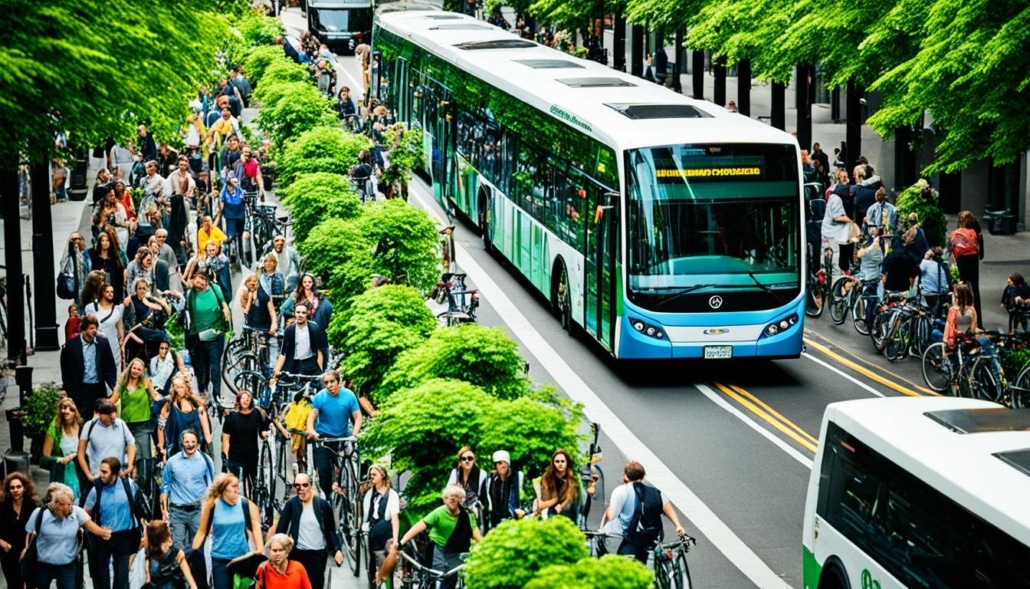Sustainable travel is gaining momentum as people become more aware of the environmental and social impact of tourism. According to the World Tourism Organization, tourism is one of the largest and fastest-growing sectors globally. Family travel is also on the rise, as parents recognize the benefits of exposing their children to different cultures and experiences. Sustainable travel involves finding a balance between tourism, nature, local communities, and the economy, without causing harm to the environment and culture. It focuses on reducing pollution, supporting local communities, conserving wildlife and nature, and promoting responsible tourism. Teaching children about sustainable travel is crucial for creating a generation that values and protects the environment.
Key Takeaways:
- Sustainable travel aims to find a balance between tourism, nature, local communities, and the economy.
- Teaching children about sustainable travel instills responsible choices and a commitment to a sustainable future.
- Pre-travel planning is essential in choosing destinations and service providers that prioritize sustainability.
- Traveling with a purpose reduces the negative impact of tourism and supports local economies.
- By teaching children to appreciate and protect the environment, parents are cultivating a generation that values sustainability.
What is Sustainable Travel?
Sustainable travel aims to find a balance between tourism, nature, local communities, and the economy. It recognizes the impact of travel on the environment, including pollution levels and wildlife disruption. Travelers should be aware of how tourism affects the local people, businesses, and native cultures. Sustainable travel focuses on promoting responsible travel behavior, protecting nature and the environment, and supporting the local community. With tourism responsible for 8% of the world’s carbon emissions, it is crucial for the industry to reduce its carbon footprint and shift towards more sustainable practices to mitigate the negative consequences on the environment and human life.
When it comes to sustainable travel, one of the key considerations is the impact on the environment. Traveling, especially by air, contributes to pollution and greenhouse gas emissions. Additionally, mass tourism can lead to habitat destruction, deforestation, and pollution of water bodies. By being conscious of these factors, travelers can make responsible choices that minimize their ecological impact.
Another aspect of sustainable travel is the impact on wildlife. In popular tourist destinations, wildlife habitats are often disrupted, leading to the displacement and endangerment of many species. Irresponsible tourism activities such as excessive noise, littering, and approaching animals too closely can negatively affect their behavior and overall well-being. Sustainable travel emphasizes the importance of wildlife conservation and encourages visitors to respect and observe wildlife from a safe distance.
Furthermore, sustainable travel recognizes the significance of supporting local communities. Traditional cultures and communities can be negatively impacted by tourism if it is not managed responsibly. By choosing locally owned accommodations, restaurants, and service providers, travelers can contribute directly to the local economy, empowering communities to preserve their cultural heritage and improve their standard of living.
The Importance of Sustainable Travel
A sustainable traveler is someone who is conscious of their travel impact on the environment and community. They aim to minimize their carbon footprint and support local communities through initiatives like carbon offset programs. Sustainable travelers show respect for wildlife and natural habitats, engage in ecotourism, and support local businesses. They recognize the cultural significance of historical landmarks and practice responsible tourism to avoid damaging them. Sustainable travelers approach different cultures with open-mindedness, respecting local customs and traditions. They actively promote and support sustainable tourism practices, encouraging others to adopt similar principles. By being sensitive to environmental sustainability, sustainable travelers strive to conserve natural resources for future generations.
Benefits of Sustainable Travel
When travelers prioritize sustainability, several benefits arise for both the environment and local communities:
- Reduced Travel Footprint: By making conscious choices, sustainable travelers minimize their negative impact on the environment, such as reducing carbon emissions and waste production.
- Wildlife Conservation: Sustainable travel practices aim to protect natural habitats and wildlife, preserving biodiversity for future generations.
- Support for Local Communities: By engaging with local businesses and artisans, sustainable travelers contribute to the economic development of communities and help create a more sustainable livelihood.
- Promotion of Responsible Tourism: Sustainable travelers serve as ambassadors for responsible tourism, educating others about the importance of preserving the environment and respecting local cultures.
Case Study: A Sustainable Traveler’s Journey
“As a sustainable traveler, I strive to make a positive impact on the places I visit. During my recent trip to Costa Rica, I stayed in eco-lodges that actively supported wildlife conservation projects. Witnessing the efforts made to protect endangered species and their habitats was both inspiring and humbling. I participated in guided eco-tours, where local guides shared their knowledge and fostered a deeper appreciation for the natural wonders of the region. By buying souvenirs directly from local artisans, I knew my purchases were directly benefiting the community. As a sustainable traveler, I felt a sense of fulfillment knowing that my actions were contributing to the preservation of this beautiful country for future generations.”
– Olivia Smith, Sustainable Traveler
Sustainable Travel Tips
Here are some practical tips for becoming a sustainable traveler:
- Choose eco-friendly accommodations that have sustainable practices in place, such as energy-efficient lighting, recycling programs, and water conservation initiatives.
- Support local businesses and artisans by buying locally made products and dining at locally owned restaurants.
- Minimize waste by bringing reusable water bottles, utensils, and shopping bags.
- Offset your carbon footprint by participating in carbon offset programs that support renewable energy projects.
- Respect wildlife and their habitats by observing from a distance and avoiding activities that may disrupt their natural behavior.
| Travel with a Purpose | Benefits |
|---|---|
| Road Trip | Opportunity to explore different destinations and support local economies along the way. |
| Weekend Trip | Quick getaways that minimize travel distances and carbon emissions. |
| Long-term Slow Travel | Immersive experiences that allow for a deeper understanding of local cultures and support for sustainable initiatives. |
| Group Travel | Shared resources and cost distribution, minimizing individual travel footprints. |
| Visiting Friends and Family Overseas | Connecting with loved ones while experiencing local customs and supporting the local economy. |
| Event Travel | Attending events that highlight sustainability and eco-conscious practices. |
| Volunteer Travel | Opportunities to give back to local communities and participate in conservation efforts. |
| Business Travel | Optimizing travel arrangements to minimize carbon emissions and support sustainable practices. |
Teaching Children about Sustainable Travel
Teaching children about sustainable travel instills responsible choices and a commitment to a sustainable future. Parents play a crucial role in imparting sustainable habits to their children, both at home and during travel. By incorporating sustainable living into their family’s lifestyle, parents can create a lasting impact on their children’s behavior and values.
Recycling to Save Energy and Reduce Greenhouse Gas Emissions
One of the fundamental sustainable habits parents can teach their children is recycling. By sorting waste and recycling materials, children learn the importance of conserving resources, saving energy, and reducing greenhouse gas emissions. Recycling not only benefits the environment but also educates children about the lifecycle of products, fostering a sense of responsibility towards the planet.
Encouraging Minimalism and Reducing Waste
Another sustainable habit parents can instill in children is minimalism. By encouraging them to buy fewer items and prioritize quality over quantity, children learn to reduce waste and minimize their environmental impact. Teaching children the value of simplicity and mindful consumption helps them understand the importance of conserving resources and reducing pollution.
Embracing Reusable Products
Using reusable products like bags, water bottles, and containers is an effective way to reduce plastic waste. Parents can teach their children to carry reusable bags for shopping, pack lunches in reusable containers, and opt for refillable water bottles instead of single-use plastics. By embracing reusability, children learn the significance of minimizing their ecological footprint and protecting the planet.
Saving Energy and Water
Teaching children to be mindful of energy and water consumption promotes conservation. Parents can involve children in activities like turning off lights when not in use, unplugging electronic devices, and taking shorter showers to save water. By instilling these habits, children learn the importance of responsible energy and water usage, contributing to a more sustainable future.
Promoting Environmental Awareness
Engaging children in activities that promote environmental awareness is key to fostering a deeper understanding of sustainability. Parents can encourage children to use public transportation, participate in community clean-up events, and engage in nature-based activities like gardening or hiking. By connecting children with the natural world and highlighting the importance of environmental conservation, parents cultivate a sense of environmental awareness and responsibility.
| Sustainable Habits | Description |
|---|---|
| Recycling | Teaching children to sort waste and recycle materials to save energy and reduce greenhouse gas emissions. |
| Minimalism | Encouraging children to buy fewer items, prioritize quality over quantity, and reduce waste. |
| Reusability | Emphasizing the use of reusable products like bags, water bottles, and containers to reduce plastic waste. |
| Saving Energy and Water | Teaching children to be mindful of energy and water consumption to promote conservation. |
| Environmental Awareness | Engaging children in activities that promote environmental awareness, such as using public transportation and participating in nature-based activities. |
By teaching children sustainable habits, parents lay the foundation for a sustainable future. Children who grow up with a sense of environmental awareness and responsible choices become advocates for positive change. Through their actions, these children contribute to a healthier and more sustainable planet for generations to come.
Pre-Travel Planning
Pre-travel planning plays a crucial role in ensuring a sustainable trip. By involving children in the process, parents can help them understand the significance of selecting destinations with minimal environmental impact. To make your trip more sustainable, consider the following:
Trip Planning
Research and choose travel service providers, transportation options, and accommodations that prioritize sustainability. Opting for hybrid, electric, or natural gas-powered vehicles and using public transportation can significantly reduce carbon emissions.
Choosing Accommodations
When selecting accommodations, look for locally owned and operated establishments that have environmentally friendly policies. By supporting these businesses, you contribute to the local economy and help reduce waste.
Packing Responsibly
Minimize your ecological footprint by packing lightly and responsibly. By bringing only what you need, you reduce the strain on resources during travel. Consider using reusable containers and avoiding single-use plastics.
“Sustainable travel is not just about what you do during your trip; it starts with thoughtful pre-travel planning.”
By involving children in these pre-travel planning activities, parents can instill the importance of making sustainable choices. This approach helps foster environmentally conscious habits and empowers children to become responsible travelers.
Travel with a Purpose
Traveling with a purpose is an important aspect of sustainable travel. Whether you’re going on a road trip, weekend trip, long-term slow travel, group travel, visiting friends and family overseas, attending an event, volunteering, or traveling for business, defining the purpose of your trip helps identify the number of travelers and their impact on the environment and local communities.
When it comes to sustainable travel, smaller groups have a lesser environmental impact and allow the local economy to benefit more significantly. By choosing destinations based on personal or family interests, avoiding over-touristed places, and opting for eco-tourism destinations that support the local community with income and conservation efforts, you contribute to sustainable travel while making a positive impact.
Consider the following examples:
- Road Trip: Embark on a scenic journey with friends or family, exploring natural wonders and lesser-known destinations. Choose fuel-efficient vehicles, carpool, and minimize stops to reduce carbon emissions.
- Weekend Trip: Plan a short getaway that aligns with your interests, whether it’s hiking, bird watching, or visiting historic sites. Opt for accommodations that prioritize sustainability, such as eco-lodges or hotels with green certifications.
- Long-term Slow Travel: Immerse yourself in different cultures, staying in a location for an extended period. Engage with local communities, support local businesses, and participate in community projects to promote sustainable development.
- Group Travel: Travel with a like-minded group, sharing costs and minimizing individual carbon footprints. Choose destinations that offer eco-friendly activities and accommodations to support sustainability initiatives.
- Visiting Friends and Family Overseas: Combine your desire to reconnect with loved ones and sustainable travel. Research activities that promote cultural exchange and support local businesses while minimizing negative environmental impacts.
- Event Travel: Attend conferences, festivals, or sporting events with sustainability in mind. Opt for eco-friendly transportation options, stay in sustainable accommodations, and choose local dining options to support the event’s host community.
- Volunteer Travel: Engage in meaningful volunteer work that contributes to environmental conservation, community development, or wildlife protection. Ensure you choose reputable volunteer organizations that prioritize sustainable practices.
- Business Travel: Incorporate sustainability into your business trips. Consider offsetting your carbon emissions, choosing eco-friendly accommodations, and exploring public transportation options instead of private vehicles.
Benefits of Traveling with a Purpose:
“Traveling with a purpose not only allows you to make positive contributions to the environment and local communities but also enriches your travel experience. By aligning your trips with personal interests and sustainable practices, you create unforgettable memories while safeguarding the planet for future generations.” – Jane Smith, Sustainable Travel Advocate
By traveling with a purpose, you participate in sustainable tourism practices, minimize your environmental impact, and support local economies. Let’s explore the benefits and possibilities of traveling with a meaningful purpose.
| Travel Type | Benefits |
|---|---|
| Road Trip | Opportunity to explore off-the-beaten-path destinations, control your itinerary, and reduce carbon emissions with fuel-efficient vehicles and carpooling. |
| Weekend Trip | Enjoy short getaways that align with your interests, support sustainable accommodations, and contribute to local economies. |
| Long-term Slow Travel | Immerse yourself in cultures, build connections, and contribute to communities through volunteer work and sustainable practices. |
| Group Travel | Share unique experiences, minimize individual footprints, and support local communities through collective efforts. |
| Visiting Friends and Family Overseas | Reconnect with loved ones while engaging in sustainable tourism practices that support local economies and cultural preservation. |
| Event Travel | Participate in events responsibly, opting for eco-friendly transportation, accommodations, and supporting local businesses. |
| Volunteer Travel | Contribute to meaningful initiatives, such as conservation projects or community development, while experiencing diverse cultures. |
| Business Travel | Incorporate sustainability into business trips by practicing green habits, choosing eco-friendly accommodations, and supporting local communities. |
Conclusion
Teaching children about sustainable travel and encouraging eco-friendly travel habits is essential for building a sustainable future. By instilling the values of recycling, minimalism, reusability, energy and water conservation, and environmental awareness, children develop a sense of responsibility towards the environment.
Traveling with a purpose and making responsible choices are key in reducing the negative impact of tourism. By choosing destinations and service providers that prioritize sustainability, we can support environmental protection and local communities. Being mindful of transportation choices and packing responsibly further contribute to eco-conscious travel.
By teaching children to appreciate the beauty of nature and protecting the environment, parents are cultivating a generation that values and protects their planet for a healthier and sustainable future. Together, we can create a sustainable future by promoting eco-friendly travel and adopting eco-conscious habits in our daily lives.
FAQ
What is sustainable travel?
Sustainable travel refers to finding a balance between tourism, nature, local communities, and the economy without causing harm to the environment and culture. It focuses on reducing pollution, supporting local communities, conserving wildlife and nature, and promoting responsible tourism.
Why is sustainable travel important?
Sustainable travel is important because it recognizes the impact of travel on the environment, including pollution levels and wildlife disruption. It also considers how tourism affects the local people, businesses, and native cultures. By promoting responsible travel behavior, protecting nature and the environment, and supporting the local community, sustainable travel aims to mitigate the negative consequences of tourism on the environment and human life.
What does it mean to be a sustainable traveler?
A sustainable traveler is someone who is conscious of their travel impact on the environment and community. They aim to minimize their carbon footprint and support local communities through initiatives like carbon offset programs. Sustainable travelers show respect for wildlife and natural habitats, engage in ecotourism, and support local businesses. They actively promote and support sustainable tourism practices, encouraging others to adopt similar principles.
How can I teach my children about sustainable travel?
Teaching children about sustainable travel involves instilling responsible choices and a commitment to a sustainable future. Parents can teach their children sustainable habits at home, such as recycling, encouraging minimalism, using reusable products, and being mindful of energy and water consumption. Engaging children in activities that promote environmental awareness, like using public transportation and growing their own food, can also foster a deeper understanding of sustainability.
What should I consider during pre-travel planning for a sustainable trip?
Pre-travel planning is an essential part of a sustainable trip. It is crucial to research and choose travel service providers, transportation options, and accommodation that prioritize sustainability. Opting for hybrid, electric, or natural gas-powered vehicles and using public transportation reduces carbon emissions. Staying in locally owned and operated accommodations that have environmentally friendly policies supports the local economy and reduces waste. Packing lightly and responsibly minimizes the strain on resources during travel.
How can I travel with a purpose?
Traveling with a purpose is an important aspect of sustainable travel. Defining the purpose of the trip helps identify the number of travelers and their impact on the environment and local communities. Choosing destinations based on personal or family interests, avoiding over-touristed places, and opting for eco-tourism destinations that support the local community with income and conservation efforts contribute to sustainable travel.
Why should I teach my children about sustainable travel?
Teaching children about sustainable travel and encouraging eco-friendly travel habits is essential for building a sustainable future. By instilling values like recycling, minimalism, reusability, energy and water conservation, and environmental awareness, children develop a sense of responsibility towards the environment. Traveling with a purpose and making sustainable choices in destinations and service providers contribute to reducing the negative impact of tourism.






